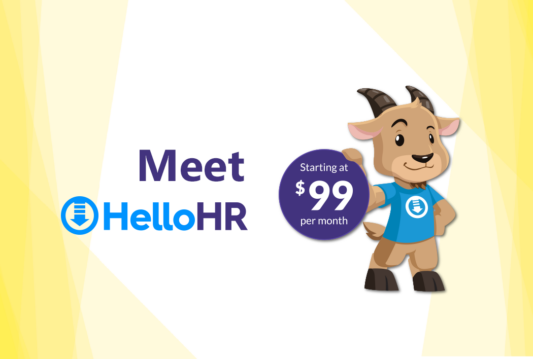
Employee education and development
If you’ve been searching for new talent, you know how competitive the recruitment market has become. With skilled candidates in high demand, companies are trying to attract applicants with incentives like competitive compensation, wellness days, additional vacation time, personalized group benefits, and work flexibility.
It’s becoming a race to find the top talent, so how can you get a competitive edge? Here’s one way to get ahead of the game: offer an employee education plan that prioritizes professional growth.
A thoughtful education plan can help you attract and retain talent, on top of many other benefits. Let’s dive into what education plans are and how you can develop the right one for your business.
What is an employee education plan?
Education plans are formal programs that give employees the opportunity to improve their current skills, gain new knowledge and skills, and advance their careers. They outline goals and objectives for employees and promote continual learning and growth throughout your organization.
To succeed, education plans should be personalized to each employee’s abilities and interests. At the same time, they also need to align with your business’s needs and goals.
Education plans are becoming increasingly popular. According to a 2021 study by Citation Canada, formerly HRdownloads, of Canadian businesses, 70% of respondents offered a tuition and conference reimbursement program as one of their core benefits.
Key takeaway: An employee education plan is a popular benefit offered by many employers to help their employees improve their skills and knowledge. A successful program promotes professional growth in employees while also supporting business goals.
What are the benefits of an education plan?
Education plans are a win-win. They help your employees develop their skills, which in turn can help your business grow. There is a big focus on training and upskilling employees right now. The Public Policy Forum recently reported that over the past three decades in Canada, there has been a steady increase in high-skilled jobs and a continuous decline in the number of mid-skilled jobs. With the growing need for skilled workers, education plans can help your business stay competitive.
Here are some of the top benefits of implementing an education plan:
- Widen your pool of candidates. With a good education plan in place, you can shift your recruitment focus away from technical skills and toward soft skills. Soft skills can be difficult to teach, so it’s important to find a candidate with the appropriate abilities for the role. Considering applicants who have the right soft skills but who may lack formal credentials or technical training can increase the number of high-potential candidates. This also opens up the role to people from a variety of educational and professional backgrounds, which can help create a more diverse and inclusive workplace.
- Improve performance and profitability. Education plans are an investment with high returns. Having skilled employees who are confident in their skills can increase productivity and lead to more efficient operations, higher quality work, and increased customer satisfaction.
- Help employees feel more valued and motivated. Focussing on career mapping and development gives employees a sense of purpose, especially when it is specific to their skills and interests. This can be very appealing to job applicants and also help with engagement and retention. Monster reports that 45% of employees were more likely to stay at their current job if they were offered more training.
- Increase your business agility. Throughout the pandemic, businesses everywhere have learned the importance of adaptability. While some changes can’t be predicted, it becomes easier to navigate challenging times when your team is prepared. By equipping employees with a wide range of skills, you can set up your business to thrive through any change.
Key takeaway: Implementing an education plan can elevate your business through generating more revenue, increasing skills, improving engagement and workplace diversity, and reducing the stresses associated with recruitment and retention.
What are the different types of education plans?
There are many kinds of education programs available. Ultimately, the one you choose should address your employees’ needs and wants and your business’s goals and budget.
Here are a few different education plans to consider:
- Annual reimbursement: This is one of the more traditional approaches, where the employer pays the cost of an employee’s education, whether it is for tuition or other educational expenses.
- Shared tuition assistance: Employees are given a certain allotment and provide information around the courses, classes, or programs for approval.
- Professional memberships: Employers pay for the employee’s membership fees to an association. Many associations provide opportunities for professional development, free and reduced-price learning, networking, and mentorship.
Key takeaway: From tuition reimbursement to shared expenses, there are many ways to offer educational assistance. Create a plan that balances your employees’ needs and your business’s objectives.
Do employees want education plans?
Employees are often balancing full-time work, family, and outside obligations. This doesn’t leave much time to consider educational advancement and professional development, even though a global survey by Deloitte found that less than half of respondents felt they had the skills they need to thrive professionally in the next few years.
For those looking to upskill, classes and webinars often happen throughout the workday. This means employees have to decide whether they want to use vacation time or take time away from work unpaid. By including paid time away from work to develop skills and focus on education, you can make continuing education much more appealing.
An alternative focus could be developing the education of not just employees but their family members. Putting family members through post-secondary education is often a huge financial burden and stress on employees. Showing that you want to invest in the future of their family can be a strong draw for candidates.
Key takeaway: Employees want dedicated time to focus on their education and skills. Investing in their learning—or the education of their family—can be particularly attractive for potential candidates.
Create an education plan in four steps
Now that you know what education plans are and all the benefits they provide, you may be eager to get started. But how do you actually create one? This is how you can implement a successful education plan:
- Assess skills – Start by distributing a soft skills self-assessment to your employees. This will help you inventory the strengths and gaps in your workplace. Once you understand your team’s skills and opportunities for growth, you can start to form a plan that will target any gaps you have identified. This analysis will also help guide your recruitment plan and give a broader view of your organization’s skillset.
- Explore plans and activities – An education plan should cater to the needs of your business and employees. It’s important to think outside the box when it comes to education offerings, because not every option will suit the needs and goals of all employees. There are a variety of opportunities you could provide, such as online courses, coaching and mentoring, job shadowing, group training classes, videos, webinars, professional association memberships, conferences, and tuition reimbursement.
- Engage and advocate – Once you create a formal education program and HR policy, share it widely throughout your organization. Post your Professional Development Policy prominently in your workplace and make it easily accessible online. But that’s just the start of the process. It’s important to have managers and senior leadership promote involvement so that everyone can see the value of the program. Work with managers to build goals for their employees around education and personal development. Once goals are set, managers should follow up regularly through check-ins with employees. You can even go a step further and assign an advocate for the program to ensure that it remains a priority throughout the year.
- Measure success – Providing an education program is great for employees, but it also needs to provide a strong return on investment. Having a set of success metrics is a good way to monitor your investment and see when you need to adjust your program. Potential metrics to consider include: turnover rate, employee satisfaction, employee engagement, revenue generation.
- Refine your strategy – As your education program continues, check in to see how employees are progressing. Managers should chat with employees about opportunities and obstacles and help them adjust their goals as needed. It’s also a good idea to create opportunities and projects where employees can collaborate and share their new knowledge. To see whether your overall education program is working, collect feedback from employees and managers. As your organization’s goals change, you may find that your program needs to adjust—this is all part of the process of sustaining a successful program.
Key takeaway: Creating and implementing an education program requires planning, analysis, and buy-in. It is important to carefully watch metrics, evaluate, and pivot when needed. Education programs take time and investment, but if properly developed, they can give your business a big boost.
Looking for the best training program? We can help!
Developing a formal education program is a strategic move that opens many possibilities. It can help you create a strong and diverse skillset throughout your workplace, increase your revenue, and become more competitive in the recruitment market.
There are many training activities and online courses available that can help your employees enhance their skills. Not sure where to start looking? We want to share one of the most comprehensive and engaging platforms available (if we do say so ourselves). Citation Canada, formerly HRdownloads, Training offers unlimited access to more than 170 training courses for all your employees. We have courses on communication, leadership, problem-solving, and much more. Ready to upskill and empower your team?
Book a free demo at a time that fits your schedule. Our experts are there when you need them, not the other way around!












